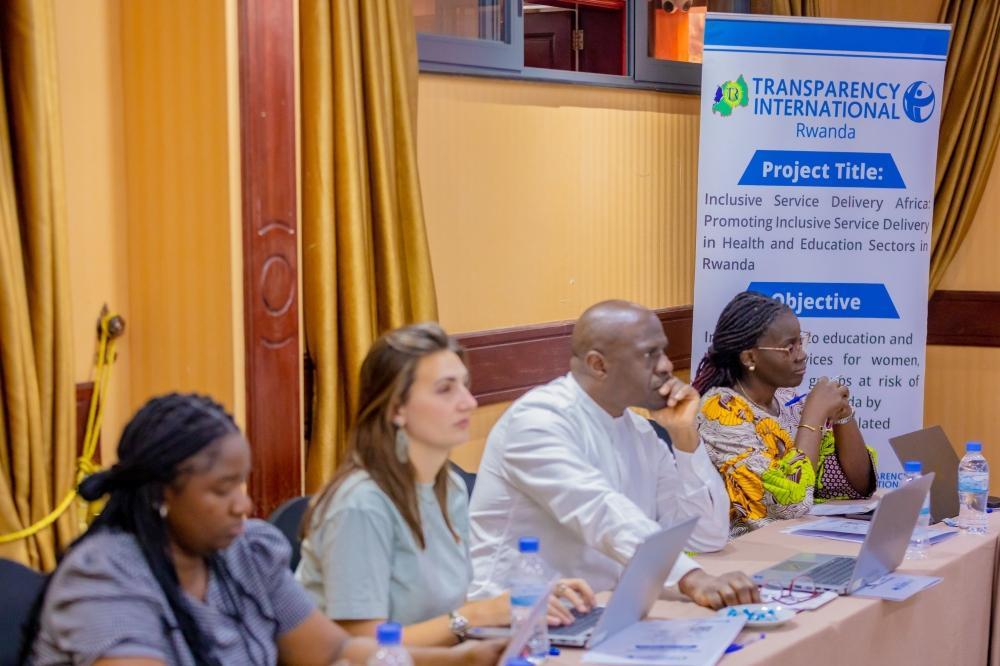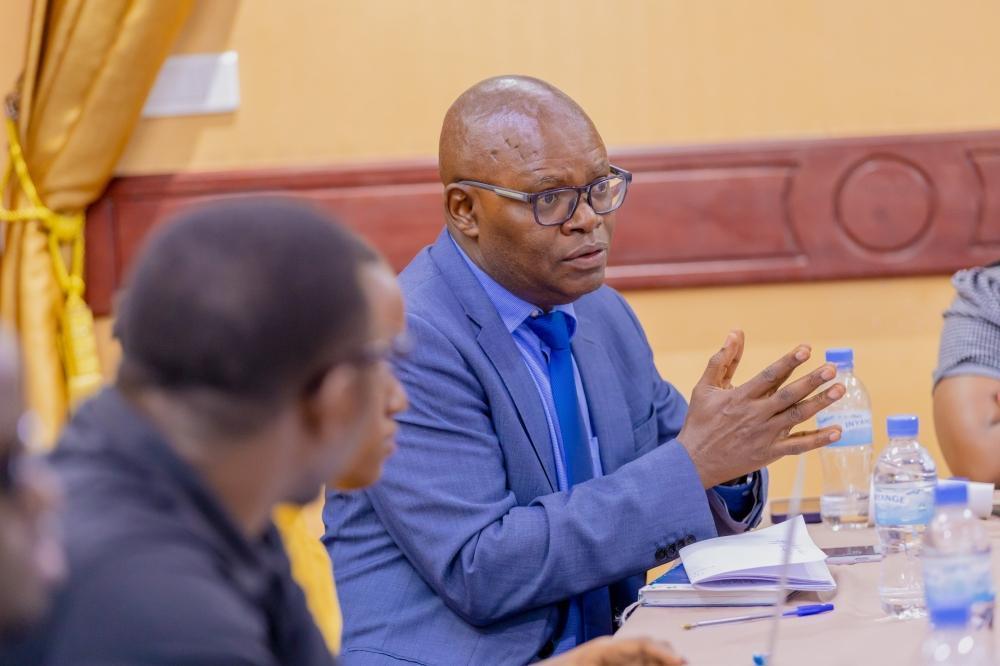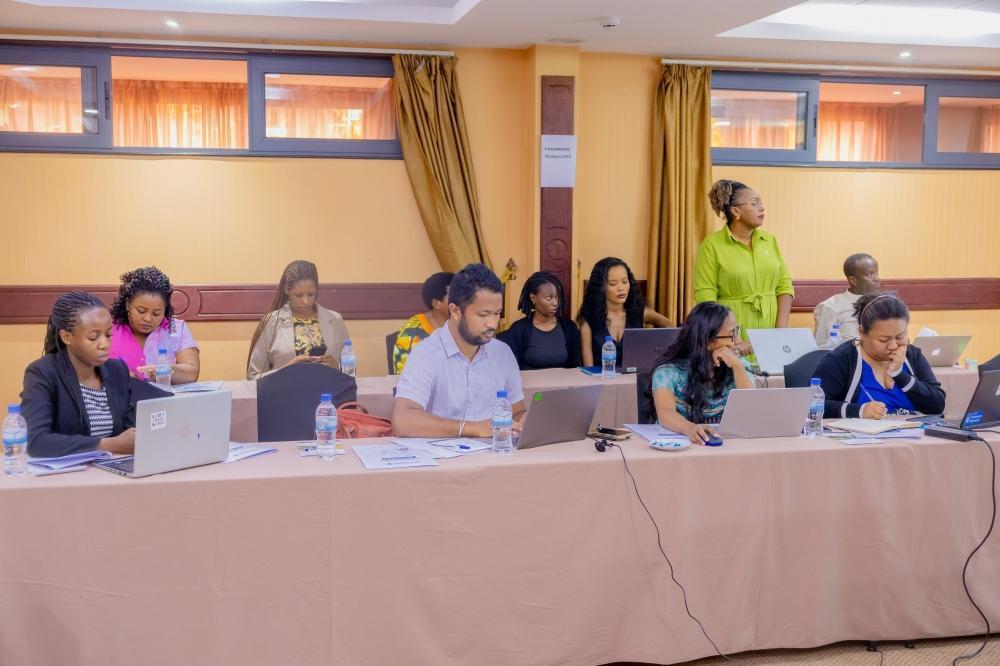Africa-Press – Rwanda. Representatives from Transparency International (TI) Chapters across Africa, who in Rwanda for the exchange ideas on governance and anti-corruption efforts, have highlighted country’s policy as a model the continent.
The four-day “Chapter-to-Chapter Learning” exchange program hosted by TI-Rwanda from August 25–28, brought together participants from Ghana, Madagascar, Uganda, Zambia, Zimbabwe, and TI’s Secretariat. Discussions centered on integrity in service delivery across health, education, and land management, among other areas.
Transparency International Rwanda’ Executive Secretary Appolinaire Mupiganyi speaks at the four-day forum
Paul Banoba, the Africa Regional Advisor at Transparency International’s Berlin Secretariat, emphasized that although corruption is difficult to measure because of its hidden nature, some countries have achieved remarkable progress. He pointed to Rwanda as an example, attributing its success to political will and commitment.
“One of the key lessons Rwanda has given to other countries is the demonstration of political will. At the very top, there is commitment to continuously improve the situation,” Banoba said on Thursday, August 27.
He noted that the principle of ‘zero tolerance’ has been central to Rwanda’s anti-corruption drive.
“Zero tolerance means that once an issue is identified, it does not matter who is involved, whether a senior politician, a relative of a powerful figure, or a celebrity. The same law applies to everyone,” he said.
He noted that this approach has seen officials in at levels of leadership held accountable for any wrongdoing they may be implicated in.
“Once the issue is identified, that’s it,” Banoba remarked.
Digitised service delivery
Banoba also highlighted Rwanda’s digitisation drive, such as the land registration system, as a major tool for reducing corruption and rights violations.
“Yesterday, the team visited Musanze and was impressed by the progress in mapping the entire land area and putting it into a system where anyone with access can verify ownership of any parcel. It was quite remarkable to see,” he said.
He emphasized that digitization has removed the bottlenecks that often fuel corruption.
“Technology means you no longer face officials who can delay your work, tell you to come tomorrow, or make excuses,” he said. “By delegating such processes to technology, Rwanda has increased transparency. The key is to keep that technology updated and ensure access across different agencies, from land services to permit offices.”
However, Banoba also acknowledged that women remain less likely than men to report corruption, calling on civil society to help close this gap. “Governments may put mechanisms in place, but they often remain underutilized if people are afraid, uninformed, or unaware of them. Civil society ensures that communities understand their rights and the tools available to them,” he said.
He commended Transparency International Rwanda for its role in sensitizing citizens and translating complex information into formats people can understand and use.
Participants from other countries echoed these lessons. Mialisoa Rendariamampianina, the Executive Director of TI Madagascar, said she was particularly impressed by Rwanda’s openness in community engagement.
“In Musanze District, we saw a community meeting where citizens presented their concerns directly to the vice mayor, especially on land access. This is something we do not do in Madagascar,” she said. “Your country is doing better in securing people’s rights to land and ensuring quality services in hospitals and schools. This is something we must learn from.”
She also highlighted how publishing citizen rights in public institutions, such as hospitals displaying patients’ rights and obligations, could inspire reforms back home. “We must educate people to fight for their rights and reassure them that they are not alone. Rwanda and other chapters are showing us the tools to make this possible.”
Annie Rose Healion, the Global Coordinator for TI’s Advocacy and Legal Advice Centres, commended Rwanda’s community-centered leadership.
“One of the things that was very beautiful to watch in Musanze was how communities work with local authorities to fight corruption and injustice, holding their leaders to account,” she said. “These exchanges help us recommit to learning from each other and implementing best practices.”
Recent data supports Rwanda’s progress. The 2024 Rwanda Bribery Index (RBI), showed a decline in bribery encounters from 22 per cent in 2023 to 18.5 per cent in 2024. TI-Rwanda attributes this trend to stronger enforcement and accountability mechanisms.
Bruce Gashema, a researcher at TI-Rwanda, stressed that collaboration with the government has been central to these achievements.
“Some chapters are surprised by how closely we work with the government in Rwanda. In other countries, citizens lack clear ways to question poor services, but here, fighting corruption is done openly in partnership with the state,” he said.
Gashema highlighted land registration as another area of success, contrasting Rwanda’s electronic system, where every plot has a unique parcel identifier (UPI), with traditional systems elsewhere that fuel disputes and fraud. He acknowledged, however, that challenges remain.
“Some individuals still resist reforms, and many citizens are unaware of their rights or continue to pay bribes for services they are entitled to. There must be a behavioural change. Receiving timely and effective services is a right, not something to be bought,” he said.
For More News And Analysis About Rwanda Follow Africa-Press








